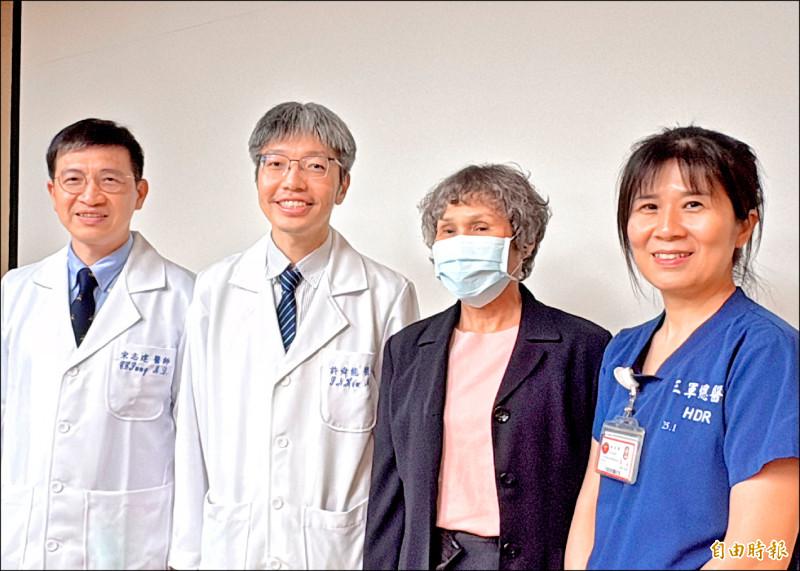Tri-Service General Hospital (TSGH) yesterday unveiled Taiwan's first AI-powered dialysis platform, saying it would enhance the efficiency and mobility of the blood filtering process for patients with severe kidney disease.
The new platform integrates information systems, AI decision support and mobile apps to not only allow a smoother delivery process, but also faster detection of dialysis complications, the Taipei hospital said.
"Taiwan currently has the highest prevalence of dialysis in the world," with a total of 89,700 patients as of 2023, said Hsu Shun-neng (許舜能), chief of TSGH's Dialysis Center, citing a report by the Taiwan Society of Nephrology.

Lin Chih-i, Taipei Times
Dialysis is a blood-filtering treatment that removes waste and excess fluid when the kidneys can no longer do so, with patients typically undergoing the procedure three times a week at hospitals, Hsu told a news conference.
The frequent long-term nature of dialysis, which usually ends only if the patient has a kidney transplant or rare recovery, requires heavy paperwork and limits patients' ability to travel abroad, he said.
"A decade ago, we speculated on whether those thick stacks of patients' dialysis records could be discarded and fully digitized" to significantly improve efficiency, Hsu said.
With that goal in mind, Hsu said that he and his team last year developed the Portable Hemodialysis Automation and Decision Support Platform, which enables clinicians on ward rounds to issue medical orders via an app integrated with the hospital's information systems.
The platform, officially launched yesterday, is already in use for 150 dialysis patients at TSGH, streamlining workflows and reducing paperwork, he said.
It also makes the dialysis process safer, as it allows for AI alerts based on data tracking via an app, Hsu added.
Another dedicated app allows patients to review their dialysis records over a one-year period, access personalized information about dialysis care and kidney disease, and receive remote guidance in support of self-management at any time, Hsu said.
That app can also generate a bilingual dialysis report for patients traveling abroad, and it allows foreign physicians to view the patients' dialysis records in Chinese and English, Hsu said.
Other clinical uses of the new AI-powered platform include analysis of patients' test results and vital signs, flagging of potential abnormalities that may signal dialysis-related complications and reminders to physicians for follow-up checks, Hsu said.
He cited the case of a 67-year-old long-term dialysis patient whose routine chest X-ray appeared normal, but was flagged by the platform as being at high risk for fractures.
A series of follow-up tests revealed that the patient did indeed have previously undetected micro-fractures and low bone density, Hsu said.
The micro-fractures were linked to severe osteoporosis in the patient, who had been on dialysis for 20 years, he said, adding that poor calcium absorption and fragile bones are side effects of chronic kidney disease.
Regarding its future development, the platform has cleared the Fast Healthcare Interoperability Resources validation, allowing for standardized data exchange with hospitals in other countries, Hsu said.
The software-led platform can integrate with existing hardware in other hospitals, including those in the US, he said.
"I think it has a real chance of being promoted worldwide," Hsu said.
However, "at this stage, I think the system is more likely to be rolled out in developed countries," he said.

US President Donald Trump said "it’s up to" Chinese President Xi Jinping (習近平) what China does on Taiwan, but that he would be "very unhappy" with a change in the "status quo," the New York Times said in an interview published yesterday. Xi "considers it to be a part of China, and that’s up to him what he’s going to be doing," Trump told the newspaper on Wednesday. "But I’ve expressed to him that I would be very unhappy if he did that, and I don’t think he’ll do that," he added. "I hope he doesn’t do that." Trump made the comments in

NOT AN OPENING: Trump’s violation of international law does not affect China’s consideration in attacking Taiwan; Beijing lacks capability, not precedent, an official said Taiwanese officials see the US’ capture of the president of Venezuela as a powerful deterrent to Beijing’s aggression and a timely reminder of the US’ ability to defeat militaries equipped with Chinese-made weapons. The strikes that toppled Venezuelan President Nicolas Maduro signaled to authoritarian leaders, including Chinese President Xi Jinping (習近平), US President Donald Trump’s willingness to use military might for international affairs core to US interests, one senior official in Taipei’s security circle said. That reassured Taiwan, the person said. Taipei has also dismissed the idea that Trump’s apparent violation of international law could embolden Beijing, said the official, who was not

A cold surge advisory was today issued for 18 cities and counties across Taiwan, with temperatures of below 10°C forecast during the day and into tonight, the Central Weather Administration (CWA) said. New Taipei City, Taipei, Taoyuan and Hsinchu, Miaoli and Yilan counties are expected to experience sustained temperatures of 10°C or lower, the CWA said. Temperatures are likely to temporarily drop below 10°C in most other areas, except Taitung, Pingtung, Penghu and Lienchiang (Matsu) counties, CWA data showed. The cold weather is being caused by a strong continental cold air mass, combined with radiative cooling, a process in which heat escapes from

Snow this morning fell on Alishan for the first time in seven years, as a strong continental cold air mass sent temperatures plunging across Taiwan, the Central Weather Administration (CWA) said. The Alishan weather station, located at an elevation of about 2,200m in central Taiwan, recorded snowfall from 8:55am to 9:15am, when the temperature dropped to about 1°C, the CWA said. With increased moisture and low temperatures in the high-altitude Alishan area, the conditions were favorable for snow, CWA forecaster Tsai Yi-chi (蔡伊其) said. The last time snow fell at the Alishan weather station was on Jan. 10, 2018, while graupel fell there